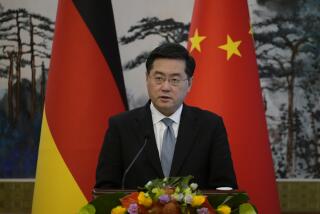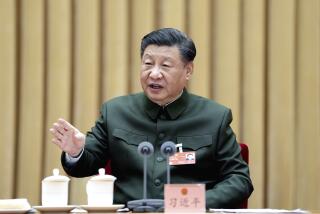‘Stick to the Socialist Road,’ Beijing Warns in Terse Threat to Dissidents : China: In the wake of the failed Soviet coup, hard-liners remind citizens that the army could enforce Communist rule.
- Share via
BEIJING — In an apparent response to the collapse of Communist authority in the Soviet Union, China sharply reminded its citizens Monday that hard-line leaders here are willing to use the army to defend their power.
Vice President Wang Zhen, in remarks published by all major state-run newspapers, stressed that the dictatorship in Beijing will not tolerate any challenge to its rule.
“The People’s Liberation Army is a strong pillar of the people’s democratic dictatorship. It is an iron-and-steel Great Wall, defending the unity of the motherland and safeguarding the socialist system,” Wang declared.
His remarks were reported by the official New China News Agency and were prominently displayed Monday in the People’s Daily and other newspapers. Wang, 83, spoke during a tour of the politically sensitive western region of Xinjiang, which borders the Soviet Union.
The main thrust of Wang’s comments were expressed in the People’s Daily: “Unite more tightly around the Communist Party’s central leadership. Unflinchingly stick to the socialist road.”
But Wang also acknowledged nagging doubts about the political reliability of both the army and the successor generation of Communist Party leaders. He said China is threatened by the possibility of “peaceful evolution” away from communism and toward democracy and capitalism.
“To win victory against peaceful evolution, the most fundamental measure is to arm the party, especially the minds of high-ranking officials, with Marxism, Leninism and Mao Tse-tung thought,” Wang declared. “Only in this way can we keep clear heads and never lose our political orientation.”
He also called for army troops and paramilitary police to strengthen their sense of “the Communist Party’s absolute leadership over the army. . . . They should listen to the party’s instructions and guarantee the consolidation and development of the socialist cause.”
Wang praised the role of the army in crushing the pro-democracy protests that engulfed Beijing in the spring of 1989, declaring that “under the correct leadership of the Communist Party’s central authorities, we have victoriously put down the turmoil and counterrevolutionary rebellion.”
He made only indirect references to last week’s collapse of communism in the Soviet Union. The People’s Daily and other papers, as well as state-run television, have given terse coverage to the failure of the hard-line Moscow coup and subsequent events. Almost all reporting has consisted of brief items by the official New China News Agency based on dispatches by the Soviet news agency Tass.
In his remarks published Monday, Wang acknowledged that “some people say Marxism is out of date.” But he insisted that such views are “completely incorrect.”
“Facing the present changeable international situation, we should have firm confidence in socialism and communism,” Wang said. “The road is tortuous and the struggle intense, but the future is undoubtedly bright. . . . Through the long struggles of one generation of revolutionaries after another, the socialist cause will go forward and true communism will ultimately be achieved.”
But Wang indicated that, despite the restoration two years ago of friendly Sino-Soviet relations, Chinese leaders now are once again fearful of a threat from the Soviet side of the long border. With the Soviet Union not only liberalizing politically, but also heading toward a breakup, Beijing seems fearful of a variety of spillover effects.
China may face not only a democratic Russian Federation neighbor, but it also could eventually see independent Muslim republics carved out of Soviet Central Asia. Such events could easily sharpen tensions between Muslim minorities and ethnic Chinese in Xinjiang. Just last year, paramilitary forces were used to crush anti-Communist rioting among ethnic Muslims in southern Xinjiang. Official media said 22 died in that incident.
More to Read
Sign up for Essential California
The most important California stories and recommendations in your inbox every morning.
You may occasionally receive promotional content from the Los Angeles Times.












